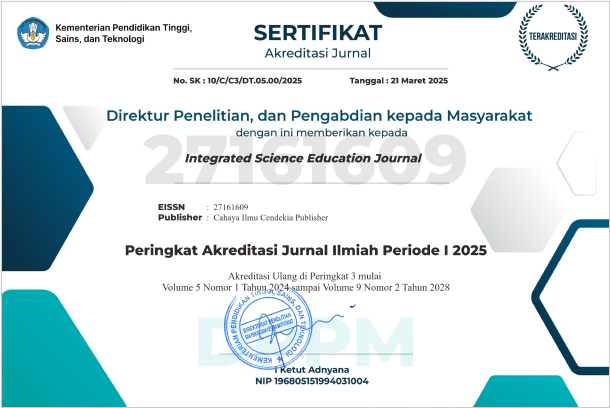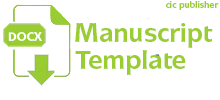Autoethnographic Projection of Climate Change Education through Project-Based Learning: Perspectives from Early Career Scholars
Abstract
Purpose of the study: Project-based learning (PBL) is an effective pedagogical strategy for climate change education. This paper investigates the support early scholars receive and the challenges they face while conducting educational interventions using project-based learning (PBL) pedagogy for high school students’ environment and climate change education.
Methodology: A collaborative autoethnographic approach was used to analyze the narratives from the projects conducted by two early scholars regarding their experiences educating high school students on environmental and climate education in Pittsburgh and Indiana, in Western Pennsylvania, US. Convenience sampling was used in this study. This research's primary data collection method includes personal narratives, reflective journals, and field notes accumulated throughout the project. A thematic deductive qualitative analysis was conducted.
Main Findings: The findings demonstrate the effectiveness of PBL supported by institutional and community partnerships. The narratives reveal that universities and administrators have greater outreach capabilities than independent project leaders. Additionally, the study found that teachers’ contributions were instrumental in enhancing student engagement. Collaboration between local universities, schools, and community organizations creates opportunities for project leaders that might otherwise be challenging to access.
Novelty/Originality of this Study: The study offers valuable strategies for project leaders to implement PBL successfully in diverse educational settings.
References
M. Moezzi, K. B. Janda, and S. Rotmann, “Using stories, narratives, and storytelling in energy and climate change research,” Ener. Res. & Soc. Sci. vol. 31, pp. 1–10, 2017, doi: 10.1016/j.erss.2017.06.034.
A. Siegner, and N. Stapert, “Climate change education in the humanities classroom: A case study of the Lowell school curriculum pilot,” Env. Ed. Res., vol. 26, no.4, pp. 1-21, 2020, doi: 10.1080/.2019.1607258.
E. Katz, L. Schifter, & A. La Pinta, “State Policy Landscape: K12 Climate Action,” Aspen Inst., pp. 7-9, 2020, https://eric.ed.gov/?id=ED610379
C. M. Williams, “Analysis of factors related to science teachers’ perceptions about climate change: Implications for educators,” Ph.D. dissertation, Dept. Edu. Pshyc. Texas Tech. Univ., Texas, USA, 2019.
A. Markula, and M. Aksela, “The critical characteristics of project-based learning: how teachers implement projects in K-12 science education,” Disc. and Inter. Sci. Ed. Res., vol. 4, no. 2, pp.1-17, 2022, doi: 10.1186/s43031-021-00042-x.
V. Kricsfalusy, C. George, and M. G. Reed, “Integrating problem- and project-based learning opportunities: assessing outcomes of a field course in environment and sustainability,” Env. Ed. Res., vol. 24, no. 4, pp. 593–610, 2016, doi: 10.1080/13504622.2016.1269874.
Harris, C. A. Kharecha, P. Goble, P., and R. Goble, “The Climate Is A-Changin’: Teaching Civic Competence for a Sustainable Climate,” Soc. St. Yo. Lea. vol. 28, no.3, pp.17–20, 2016, https://pubs.giss.nasa.gov/abs/ha09710x.html
M. C. Monroe, R. Plate, A. Oxarart, A. Bowers, and W. A. Chaves, Identifying effective climate change education strategies: a systematic review of the research. Environmental Ed. Res., vol. 25, no. 6, pp. 791–812, 2017, doi: 10.1080/13504622.2017.1360842
J. W. Roberts, Ed., Experiential Education in the College Context. New York: Tay. & Fran., pp. 11-28, 2016, doi: 10.4324/9781315774992
E. Eilam, “Climate change education: the problem with walking away from disciplines,” Stud. in Sci. Ed., vol. 58, no. 2, pp. 231–264, 2022, doi: 10.1080/03057267.2021.2011589.
P. Satizábal, I. Cornes, M. D. Zurita, and B. R. Cook, “The power of connection: Navigating the constraints of community engagement for disaster risk reduction,” Int. J Dis. Risk Red., vol. 68, no. 102699, pp 67-79, 2022, doi: 10.1016/j.ijdrr.2021.102699
S. Hoidn, and S. Olbert-Bock, “Learning and teaching research methods in management education: Developing a curriculum to combine theory and practice–a Swiss case,” Int. J of Ed. Manag. vol. 30, no. 1, pp. 43–62, 2016, https://eric.ed.gov/?id=EJ1086042
K. E. McNamara, and L. Buggy, “Community-based climate change adaptation: a review of academic literature,” Loc. Env. vol. 22, no. 4, pp. 443–460, 2017, doi: 10.1080/13549839.2016.1216954.
C. D. Trott, “Reshaping our world: Collaborating with children for community-based climate change action,” Act. Res. vol. 17, no. 1, pp. 42–62, 2019, doi: 10.1177/1476750319829209.
E. Spier, R. L. González, and D. Osher, “The role of the community in learning and development,” in The Wiley Handbook of Teaching and Learning, G. E. Hall, L. F. Quinn, and D.M. Gollnick, Ed., New Jersey: Wiley, 2018, pp. 52-66, 2018, doi: 10.1002/9781118955901.ch4.
OECD (2019), Education at a Glance 2019: OECD Indi., OECD Publishing, Paris, doi: 10.1787/f8d7880d-en.
S. Kuppa, “Do Millennials See Climate Change as More than Just a Meme?” Ener. Pol. and Cli. Prog., Johns Hopkins University, Washington DC, 2018. http://jhir.library.jhu.edu/handle/1774.2/59878
A. E. Plutzer, J. Hannah, M. Rosenau, M. B. Mc Caffery, and A. H. Reid, “Mixed Messages: How Climate Change Is Taught in America’s Public Schools,” Wright State University, Ohio, Rep. 35, 2016. https://corescholar.libraries.wright.edu/political_science/35
J. Totz: Climate Generation: A Will Steger Legacy. 2018. Position Statement on Climate Change Education in the Humanities. Climate Generation Blog. Link. https://climategen.org/blog/climate-lessons-update-december-2018/
G.O. Schreiner, “Perceptions of scientific assessment effectiveness,” Env. Dev., vol. 52, 2024, doi: 10.1016/j.envdev.2024.101073.
W. N. Bender, Ed., Project-based learning. London: Corwin SAGE Pub., 2012.
Y. Yusnidar, E. Epinur, and N. A. Nadila, “Analysis of Student Responses to Student Worksheets Based on Project Based Learning Models”, In. Sci. Ed. J, vol. 4, no. 3, pp. 111-116, 2023, doi: 10.37251/isej.v4i3.718.
J. S. Vogler, P. Thompson, D. W. Davis, B. E. Mayfield, P. M. Finley, and D. Yasseri, “The hard work of soft skills: augmenting the project-based learning experience with interdisciplinary teamwork,” Inst. Sci. J, vol. 46, pp. 457–488. 2018, doi: 10.1007/s11251-017-9438-9.
M. Monita, R. Asyhar, and P. Murni, “Development of Integrated Learning Tools for Character Values in Science Subjects in Junior High School,” In. Sci. Ed. J, vol. 5, no. 1, pp. 19-33, 2024, doi: 10.37251/isej.v5i1.692.
Z. Siddique, S. Parveen, and M. Sahana, “A Paradigm Shift in Learning: Assessing West Bengal’s Education System in the Post-Pandemic Era” in COVID-19, M. Ali and R. Akhter, Ed. United Kingdom: Routledge, 2024, pp. 140-153.
P. Almeida, González, L.R., Flores, E.O, Venise, C., and A. Padilla, “The building blocks of community participation in local climate meetings,” npj Clim. Act., vol. 2, no. 37, pp. 71-74, 2023, doi: 10.1038/s44168-023-00071-4.
Lee, S. Jean., S. Blackwell, J. Drake, and K. A. Moran, “Taking a leap of faith: Redefining teaching and learning in higher education through project-based learning,” Interdis. J. of Prob-Bas. Lea. vol. 8, no. 2, pp. 3-13, 2014, doi: 10.7771/1541-5015.1426.
R. Sandhu, K.H. Channi, D. Ghai, C.S. Cheema, & Kaur, M. “An Introduction to Generative AI Tools for Education 2030,” in Integrating Generative AI. K.K. Hiran, M. Dadhich, R. Doshi, S. Poddar, Ed. New York: IGI Global, 2024, pp. 1-28.
C. Ellis, T. E. Adams, & A. P. Bochner, “Autoethnography: An overview” Hist. Soc. Res./Histor. Sozial., vol. 36, no. 4, pp. 273-290. 2011, https://www.jstor.org/stable/23032294
L. Nahar, “The effects of standardized tests on incorporating 21st-century skills in science classrooms,” In. Sci. Ed. J, vol. 4, no. 2, pp. 36-42, 2023, doi: 10.37251/isej.v4i2.324.
F. Mahmood and S. Ali, “Harnessing Art as a Catalyst to Environmental Awareness,” in Cases on Collaborative Experiential Ecological Literacy for Education, L. Nahar, N. Tayem, Ed. Pennsylvania, USA: IGI Global, 2024, pp. 111-131.
R. Roux, J. Dirk, J. L. Nel, G. Cundill, P. O’ Farrell, and C. Fabricius, “Transdisciplinary research for systemic change: who to learn with, what to learn about, and how to learn,” Sust. Sci. vol. 12, pp. 711-726. 2017, doi: 10.1007/s11625-017-0446-0.
R. Agni, A. Febriawan, and S. Zainal, “Uncovering the Veil: Overcoming Challenges in Science Teaching Standards,” In. Sci. Ed. J, vol. 5, no. 3, pp. 181-186, 2024, doi: 10.37251/isej.v5i3.1272.
M. D. W. Ernawati, H. Haryanto, H. Harizon, Y. Yusnidar, N. N. Qoidah, and M. Udhiyah, “Analysis of Teacher Response to Problem-Based Learning Model and Scaffolding Model in Science Subjects,” In. Sci. Ed. J, vol. 4, no. 3, pp. 123-127, 2023, doi: 10.37251/isej.v4i3.733.
G. Huber, “Exercising power in autoethnographic vignettes to constitute critical knowledge,” Sag. Org., vol. 31, no. 1, pp. 49-65, 2024, doi: 10.1177/13505084221079006.
M. Arnold, “Problem-based Learning and Community Engagement: A Service-Learning Project with Social Pedagogues,” in Fahr, U., Alessandra, K., Angenent, H., Eßer-Lüghausen, A. (eds) Hochschullehre erforschen. Diversität und Bildung im digitalen Zeitalter.Wiesbaden, Germany, Springer. VS, ch.1, pp.3-27, 2022, doi: 10.1007/978-3-658-34185-5_11
M. Sell, R. Schiera, Z. Siddique, S. White, and J. Babal, “Decision Literacy, Multimodal Storytelling, and the Digital Storygame Project,” Eng. J, vol. 112, no. 3, pp. 28-35, 2023, doi: 10.58680/ej202332226.
L. Nahar, “Assessing the Influence of a High School Environmental Project on Teacher Readiness Across Borders,” in Cases on Collaborative Experiential Ecological Literacy for Education, L. Nahar, N. Tayem, Ed. Pennsylvania, USA: IGI Global, 2024, pp. 1–25, https://kappanonline.org/research-project-based-learning-de-vivo/
S. Wynes, and K. Nicholas, “The Climate Mitigation Gap: Education and Government Recommendations Miss the Most Effective Individual Actions,” Env. Res. Let., vol. 12, no. 7, pp. 1-8, 2017, http://iopscience.iop.org/1748-9326/12/7/074024.
Copyright (c) 2025 Zeeshan Faiez Siddique, Lizoon Nahar, Farheen Mahmood

This work is licensed under a Creative Commons Attribution 4.0 International License.
Authors who publish with this journal agree to the following terms:
- Authors retain copyright and acknowledge that the Integrated Science Education Journal is the first publisher licensed under a Creative Commons Attribution 4.0 International License.
- Authors are able to enter into separate, additional contractual arrangements for the non-exclusive distribution of the journal's published version of the work (e.g., post it to an institutional repository or publish it in a book), with an acknowledgment of its initial publication in this journal.
- Authors are permitted and encouraged to post their work online (e.g., in institutional repositories or on their website) prior to and during the submission process, as it can lead to productive exchanges and earlier and greater citation of published work.







.png)
.png)






